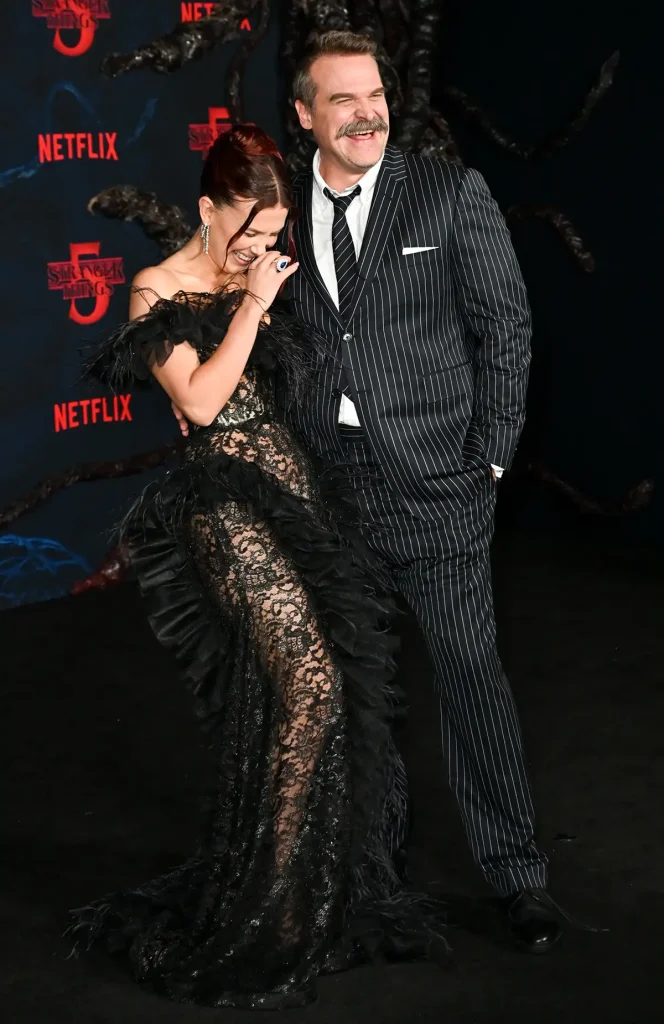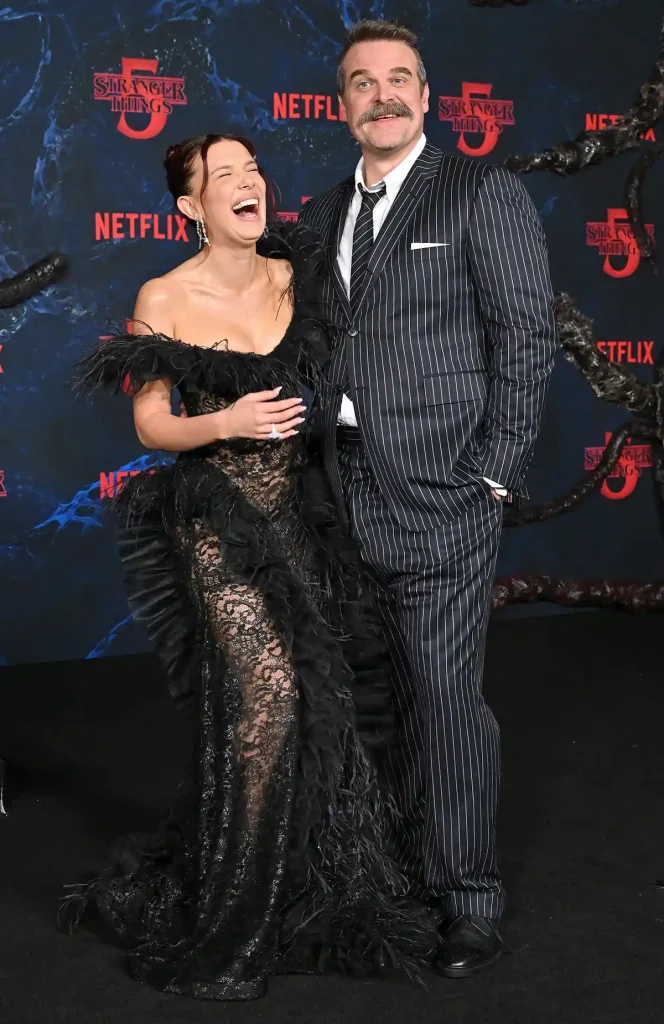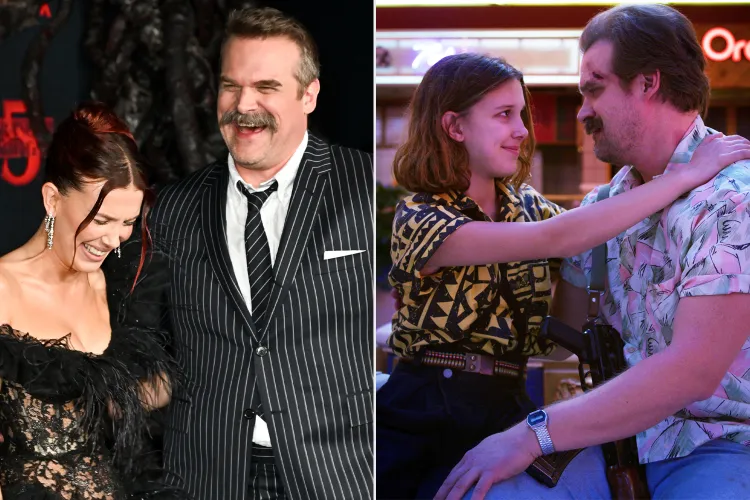Millie Bobby Brown Breaks Silence at “Stranger Things” Premiere, Praises David Harbour Despite Reported Harassment Complaint
At the star-studded premiere of the fifth and final season of Stranger Things in Los Angeles on November 6, 2025, a moment between co-stars Millie Bobby Brown and David Harbour captured attention not just for its red-carpet glitter but for the undercurrent of a quietly unfolding controversy. Brown, age 21, took the stage and publicly praised Harbour, age 50, reflecting on their father-daughter dynamic in the series and the bond they share, even as a report surfaced that Brown had previously filed a harassment and bullying complaint against her long-time costar. The juxtaposition of affection and allegation has drawn both curiosity and deeper questions about behind-the-scenes dynamics on one of Netflix’s most popular shows.

From the moment Brown and Harbour stepped into the glare of the spotlight together, their warmth was evident. Brown said of Harbour, “I’ve obviously had a really special bond with David because we have a father-daughter relationship, and we do every scene together.” Harbour responded in kind, calling Brown someone he “adores,” and added that he doubted it would be the last time they worked together. These remarks stand in contrast to reporting from November 1 by the tabloid Daily Mail, which claimed Brown filed a detailed harassment complaint against Harbour prior to filming of the final season. According to sources in that story, the complaint was lengthy, contained “pages and pages of accusations,” and prompted an internal investigation that lasted for months. Neither Brown’s representatives, Harbour’s team nor Netflix publicly confirmed or denied the allegations.
The premiere event itself was billed as a celebratory farewell to the show that launched Brown’s career and reinvigorated Harbour’s. Yet amid smiles and applause, there was a distinct undertone of complication. Brown’s remarks, delivered on the red carpet, conveyed genuine appreciation for the journey she and Harbour have shared — a journey that began when she was just 12 and he, playing Jim Hopper, became the father figure to her character Eleven, and by extension, a mentor-figure off screen. Harbour himself has spoken previously of his protective instinct toward Brown, saying in a 2021 podcast appearance that he worried about her “and the fame and all that she has to struggle with.” The full circle this evening represented felt, in that light, emotionally resonant.

Still, the report of the complaint has left open questions and cast a shadow over that closeness. The allegations, if true, suggest a rift at odds with the public image of harmony and camaraderie. The show’s executive producer, Shawn Levy, addressed the matter at the premiere, stressing that their set strives to be “a respectful workplace where everyone feels comfortable and safe.” Though he did not comment specifically on the complaint, his remarks acknowledged the “noise around it” and affirmed that the cast and crew are treated “like family.”
For Brown, this moment marked the first time she publicly commented on Harbour since the report emerged. Her words, while appreciative, were carefully measured. She emphasized the significance of working with him while acknowledging that their on-screen father-daughter relationship has been “so special” and that fans would get to see more of it in season five. There was no mention of the complaint in her remarks. Harbour, too, stuck to his script of respect and admiration, offering few glimpses into the wider circumstances. In doing so, both actors seemed to signal a choice to project unity despite underlying controversy.
The timing of everything matters. The final chapter of Stranger Things carries huge weight — the series has global reach, a devoted fan base, and a pop-culture footprint. Brown and Harbour’s characters have grown alongside each other over a decade, and their personal relationship has often mirrored that evolution. To the public, their appearance at the premiere suggested continuity: the connection remains, the show endures, and the behind-the-scenes difficulties either resolved or relegated to private rooms. But for any observant watcher, the tension between public performance and private conflict invites deeper reflection.

There’s also the broader context of power dynamics in entertainment: a young actress working with a veteran costar, high-stakes production schedules, intense public gaze — all the ingredients for pressure and potential discord. The alleged complaint, if credible, reminds us that even shows celebrated for their camaraderie and fun can have unseen strains. Brown’s decision to publicly praise Harbour could be interpreted in several ways: as genuine acknowledgement of support, as professional courtesy, or as a strategic gesture to diffuse speculation. Without official confirmation of the investigation’s findings, the full story remains opaque.
From Brown’s perspective, this premiere moment may serve as a testament to resilience and gratitude. Her remarks centered on growth, collaboration and the deep connection between her and Harbour, both onscreen and off. From Harbour’s standpoint, the event reaffirmed his ongoing respect for Brown and the wider cast, as well as his investment in the legacy of the series. For the fans, the moment offered reassurance: despite rumors, the two appear aligned and committed to the show’s conclusion. For the cast and crew, the red-carpet scene likely signified a public front of unity, even if private discussions continue.
As the final episodes of Stranger Things roll out — set in three volumes, with Volume 1 arriving November 26, Volume 2 on December 25 and the finale on December 31 — the central narrative may spawn its own controversies. But the actors’ red-carpet conduct matters too: what they choose to say, what they choose to leave unsaid, and how they navigate professional relationships in public view. Brown’s praise of Harbour amounted to a moment of reconciliation or at least solidarity, and it shifted the conversation away from accusation to acknowledgement — though not entirely away from question.
In the end, this story is about more than celebrity headlines. It touches on how young stars mature in the limelight, how long-standing professional relationships evolve, and how allegations of misconduct reverberate when layered over large-scale productions. It speaks to the intersection of affection and accountability, and to the ways public figures manage both. Brown and Harbour’s expressions of respect on that Los Angeles evening offered a particular kind of narrative: one of continuity, of partnership, and of the show that brought them together. Whatever remains unsaid now will likely unfold in time.


